Leading a 175-year-old ‘startup’ — With National Life’s Mehran Assadi
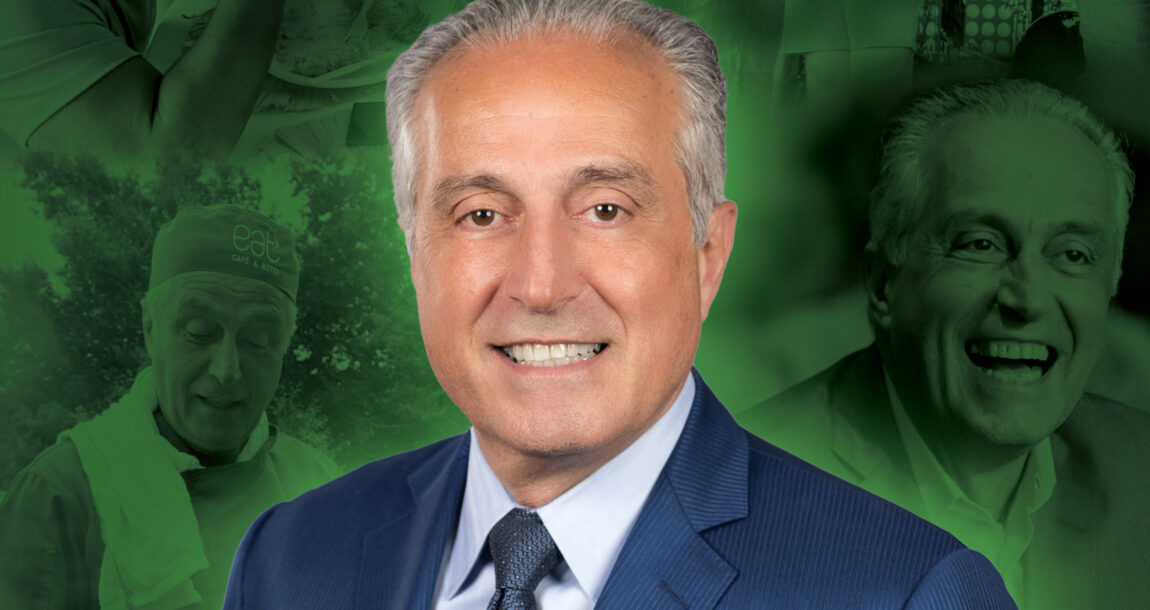
National Life Insurance Co. started 175 years ago. In 1996, it acquired Life Insurance Company of Southwest, which became part of National Life Group. Today, as the No. 1 provider of indexed universal life and the No. 1 provider of fixed index annuities within the employer-sponsored K12 space, Mehran Assadi has led the company to the highest pinnacle of success. “I found a company with a clean balance sheet and tremendous runway,” he said. “I really fell in love with the people of the company and their spirit.”
About 80% of National Life’s business “comes from the middle market,” says Assadi, who believes that financial literacy is crucial to serving that market.
“Our mandate is one of financial literacy versus pushing products. When you are helping someone to learn something as important as financial security, you are keeping a family together. You are helping a business to have a legacy. So, we need to explain what it is we do in most simple terms. That’s one of the reasons that I say that simple is hard.”
In this interview with InsuranceNewsNet Publisher Paul Feldman, Assadi describes how National Life Group is committed to serving the middle market, offering the right products for this moment in time and bringing new people into the business.
Paul Feldman: You’ve had an illustrious career in the insurance industry. How did you get into the industry, and how did you find yourself here?
Mehran Assadi: I started in the insurance industry as a software developer, and clearly, the question in your mind is: “How does a geek become a businessperson?” The story is straightforward. The concept of understanding your client and understanding what the software was going to be used for was very important to me. Therefore, I spent a lot of time with the businesspeople for whom I was designing technology platforms, to understand their business. In that way, I could build something that could be useful.
I ended up spending a lot of time with people within the investment part of the company I was with. I spent time with people in corporate finance, actuarial people, as well as distribution and marketing people. I connected with and enjoyed working with people within marketing and distribution because it was all about business development and how you can leverage technology for the betterment of your business.
Eventually, people wanted me to participate in strategic planning initiatives, blueprinting business opportunities, and I ended up in business development and strategic planning within financial services. So here we are four decades later.
Feldman: Tell me more about that. That seems like a wild ride to get from programmer to CEO.
Assadi: The whole idea of business is not just about IQ. Business is about emotional and social intelligence, and it’s about relationships. I think a lot of learning happens when you are around the people who have tenure in the business. If you have a thirst for learning, then you’re going to be like a sponge; you’re going to start picking up things along the way that help you with the business. I believe in the value proposition of our business. I started in this business in the property/casualty sector and gravitated toward protection and retirement. I enjoy the value that we deliver to our clients and appreciate what an honorable profession this business is.
Feldman: Indeed, it is an honorable profession. Tell me a little bit about your early days at National Life.
Assadi: When I joined National Life, I was supposed to be here for 90 days as an executive consultant working with the executive leadership of the organization — the chief financial officer, the president of the company — in order to work on a strategy around business and technology. And 90 days became 180 days because the project needed that kind of duration. After that, there was a change in leadership and I was asked to step in as an interim chief operating officer.
From there, I committed the biggest sin a consultant can commit: I fell in love with my client — the people in the company, the direction of the company — and found this company that was like a precious jewel that just needed some strategic direction in order to become what we have become. I found a company with a clean balance sheet and tremendous runway, and I was asked to stay. I fell in love with the people of the company and their spirit.
Feldman: Your company has grown so much over the years. What are some of the changes you made to National Life to make that happen?
Assadi: We are not normal. We are a 175-year-old startup. We think about ourselves as a startup
Feldman: I think everybody should think of their business as a startup.
Assadi: My favorite day of the year is Jan. 2 — not Jan. 1.
Feldman: Why is that?
Assadi: Jan. 2 is an opportunity for rebirth, as far as your business is concerned. It’s an opportunity to capitalize on all the things that have worked for you as a business, as well as what you have learned in the prior year, and apply those learnings so you can become a better company worthy of the trust of your agents, advisors and your clients. We get to do that every year. Every year is a new beginning, a new opportunity to take your game, your business, to the next level.
In terms of the success that we have experienced, it’s very much tied to being a mission-driven and purposeful company. Our mandate is one of financial literacy versus pushing products. It all started with us envisioning our vision, mission and values. Our vision is to bring peace of mind to everyone we touch. That’s what insurance is all about.
Our mission is keeping our promises. Pretty straightforward. Our values are to do good, be good and make good on our intentions, our actions and the outcome. I encourage you to compare our vision, mission and values to other financial services companies. In this company, we believe that simple is hard.
Feldman: Simple is hard. I like that. That’s true in life and business.
Assadi: Our people can describe what doing good means to them and what being good is all about. To be worthy of staying in this business, you must be at the top of your game. So as an individual, you must continually improve. As an organization, we must continue to improve in order to be worthy of the trust that our agents and clients put in us. We are much more about financial literacy power than about pushing products.
Feldman: One way that you’re bringing new people into the business is multilevel marketing. Tell us a little bit about that.
Assadi: First of all, in our business, we have multiple segments and multiple distribution. So, you’re correct. Part of that is multilevel. To that end, that’s one of the entry points into our business because when you take a look at the number of agents and producers in our industry, we are not necessarily growing by leaps and bounds. So that’s a good point of entry.
The other part is that this country is a melting pot. When you look at the distribution of National Life Group, our producers and our representatives reflect the diversity that exists in our country. It is a story of living the American Dream, from my point of view.
There is a sustainable and responsible way to do business. That’s the way we operate as an organization. It is about training your producers, encouraging them to put the priority on doing the right things for our clients. We encourage our producers to take ownership in the well-being of people they support, and continued education is very important. We have many highly skilled professionals — who are what I refer to as boots on the ground — who provide training on Saturdays, Sundays, evenings in order to make sure that the skills of the people who are representing our organization are sharp. Continuing education is a priority in our company.
Feldman: I love the term “boots on the ground” because I say that all the time in my business. You must have the boots. And we don’t have enough boots. How do we get more boots on the ground?
Assadi: I think as an industry, we are misunderstood. Look, I started in this business as a software developer. You don’t want to go to a cocktail party and tell people you’re in life insurance. You want to tell them you’re a software developer, you’re working for a startup.
The reason behind that is because we are misunderstood as an industry. We need to tell our story, and that becomes a way of recruiting to this industry. Think about this for a second. Why did we go through the process of re-envisioning our vision, mission and values? Because we had to get our house in order. We had to make sure that our associates who’ve been part of the company for many years take ownership of this honorable profession that we are part of. It became part of the education and advocacy for the industry.
To get more people and attract more talent to this industry, we must tell our story in terms of our value proposition of protection and retirement. We must tell our story that there are more than 100 million people in this country who are underinsured or who don’t have any insurance. We must tell the story of financial literacy. Some people have a bad relationship with money. All of us have family members who can use that help, right?
When you help someone to learn something as important as financial security, you keep a family together. You help a business to have a legacy. So, we must explain what it is we do in the simplest terms. That’s one of the reasons that I say that simple is hard.
Feldman: National Life is a mutual company. Tell me about the differences between a mutual company and a stock company.
Assadi: So let me start by sharing with you that I refer to National Life as a progressive mutual. The follow-up question often is: What is a progressive mutual? So progressive mutual, the way I think about it, is a company that cares about performance — top line, bottom line and every measurement in between, just like a public company. At the same time, because insurance is a long-term business, we have the patience of a mutual company — we know this is a long-term business, and that is the way we think about the way we serve our clients and the way we make investment decisions.
We are not on a short fuse. I don’t have limited partners that I have to pay; I don’t have shareholders that I need to please. The only people that I have to please are my clients.
Feldman: Tell me about the products you sell. Where are your big markets?
Assadi: I would describe us as a permanent insurance life insurance company. We have multiple products: whole life, UL, term and IUL. So that’s our life product portfolio. In annuities, we have fixed index annuities and fixed annuities as well. About 80% of our business comes from the middle market. Our definition of middle market is families with annual income anywhere from $70,000 to $175,000. And you may say that’s a pretty wide range, but if someone is earning $80,000 in a small town in the Midwest, for example, that’s different than a middle-class family living in Orange County, California, and making that same amount of money. So that’s why the range is so wide. It’s usually families of two professionals.
We are the No. 1 provider of indexed universal life. We have entered our third year in that spot, which we’re very proud of. When it comes to the annuity business, we are the No. 1 provider of fixed index annuities within the employer-sponsored K12 space. We’ve been No. 1 for roughly two decades in that space. We serve Teachers of America, which is one of my favorite markets because I come from a family of educators.
Everybody talks about how we need to take care of the teachers and other underappreciated workers — but guess what? In this industry, we are able to say thank you to people by basically providing a 403(b) type of business, which is tax-sheltered annuities for teachers. We can help teachers retire with the dignity they deserve.
Feldman: Tell me about your IUL business, because National Life is a leader in that space. How did you become the leader?
Assadi: I think fixed index universal life is one of the most innovative products in the marketplace. From my point of view, it’s a product that gives people an opportunity not only for protection, but also an opportunity in terms of building cash value, especially with our living benefit writers.
Our perspective at National Life is that we offer a new kind of life insurance: life insurance that is not only about dying. Because often when you talk to people about life insurance, they immediately think about death benefit. And in our case, it is not only about death benefit. Sixty percent of us will have some sort of a short-term disability. In terms of living benefits, the riders on our life insurance products provide protection when it comes to those life events.
Alzheimer’s disease, for example, is a major concern in today’s environment. Everybody knows somebody who’s dealing with that. I think that’s an innovative option that we have created as it relates to living benefits. We also have a fertility rider. About 2% of couples have fertility challenges. The question is: How do you support people creating families?
Feldman: That’s really interesting. I’ve never heard of a fertility benefit from a life insurance company.
Assadi: And terminal critical illness riders, from my point of view, really create a different opportunity for families and for business owners.
Feldman: Thinking about the fertility benefit, having children helps you live longer.
Assadi: Correct. No question about it. First, I’m very proud of my teammates. As a matter of fact, I was very excited about this innovation by my team. And when you’re talking to young people about life insurance, now you have a way to get their attention. Now you have a way of talking to them about a product that is not just about dying.
Now, I want to be very clear, the foundation of any life insurance is the death benefit. However, these are enhancements that we have made in designing these products. The mindset around this clearly is to market to millennials and Generation Z. By the way, Gen Zers are no longer 18-year-olds. They are aging and growing.
This age group has lived through COVID-19. So they are concerned with mortality. And I think based on their life journey, they have realized that it’s their responsibility to prepare for the unknown. From my point of view, indexed universal life is a creative design of a traditional product that is the right fit for this century.
Feldman: So how do we get more Gen Zers and millennials into this industry?
Assadi: It’s all about education. It’s all about what we do in this industry. When we started our journey of growth over the past dozen years, we started to recruit a lot of 21- and 22-year-olds and we educated them in terms of the value proposition of this industry. We basically told them: “Look, we recruit from middle America to serve middle America with the premiums that we collect. We support the economy of the country because, in short, financial services companies are the No. 1 buyers of corporate and government bonds.”
When you are connecting the dots for people in terms of what this industry means to our clients, serving the communities that we all care about and being part of the solution, I think Gen Zers and millennials are quite attracted to this industry. We just need to tell our story differently.
Feldman: So what is that different story?
Assadi: Be part of something that’s bigger than you. If you want to serve, come and join us because this is a service industry. We take care of teachers, first responders, EMTs, police officers; we take care of business owners. And by the way, National Life is a major supporter of our community.
Last year in July, we had a flood in Vermont, where one of our two headquarters is located. For the past 10 years, we’ve been throwing a benefit concert in the backyard of our headquarters in Vermont. The first year, it was a couple of thousand people. Our highest number was 10,000 people. We raised money for local charities.
Last year because of the major flooding in Vermont, we really couldn’t host 10,000 people at a concert. And so, we went on a local CBS affiliate for three hours, and by the time it was all said and done, we raised $1.73 million to support the town that we are part of.
I cannot even say we are not your father’s or your mother’s insurance company, because we are a 175-year-old startup. Every time we see an opportunity and a challenge, we want to take it on. We want to bring the best version of ourselves, and we want to exceed expectations.
This is an exciting industry. You are hearing that from a guy who started as a software developer and fell in love with this industry that he knew nothing about. And I love it today as much as I did back then. If you’re a lifetime learner, this is a perfect industry for you.




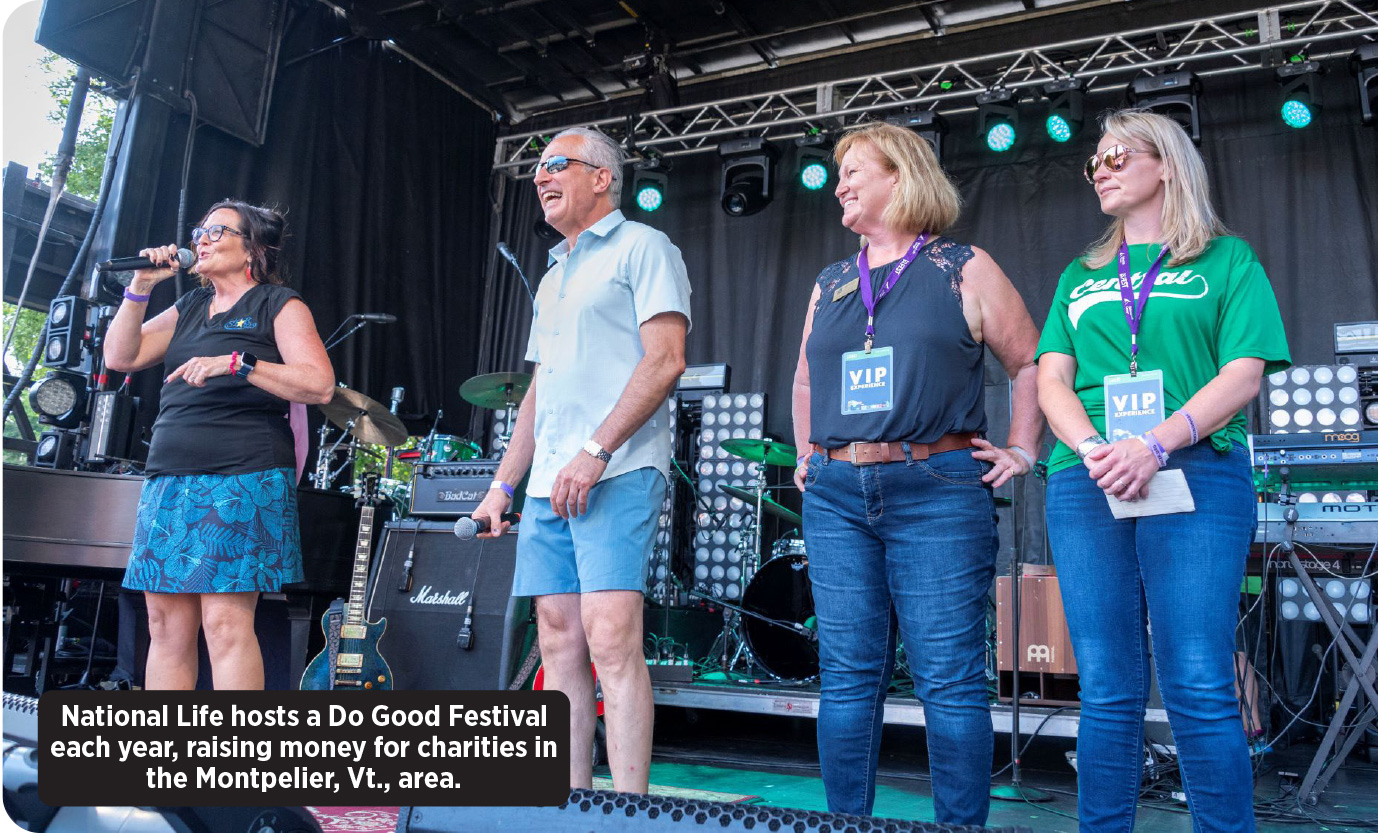
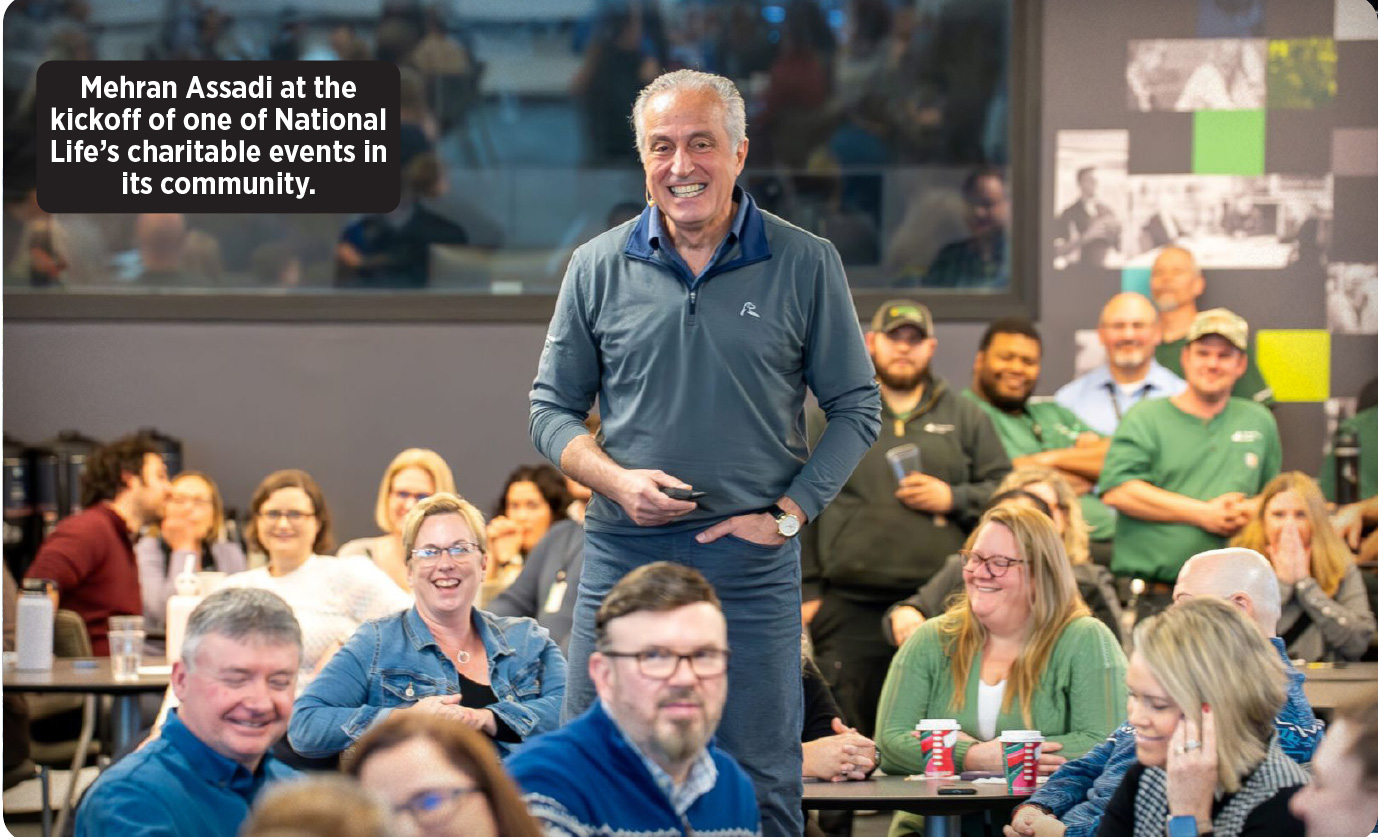
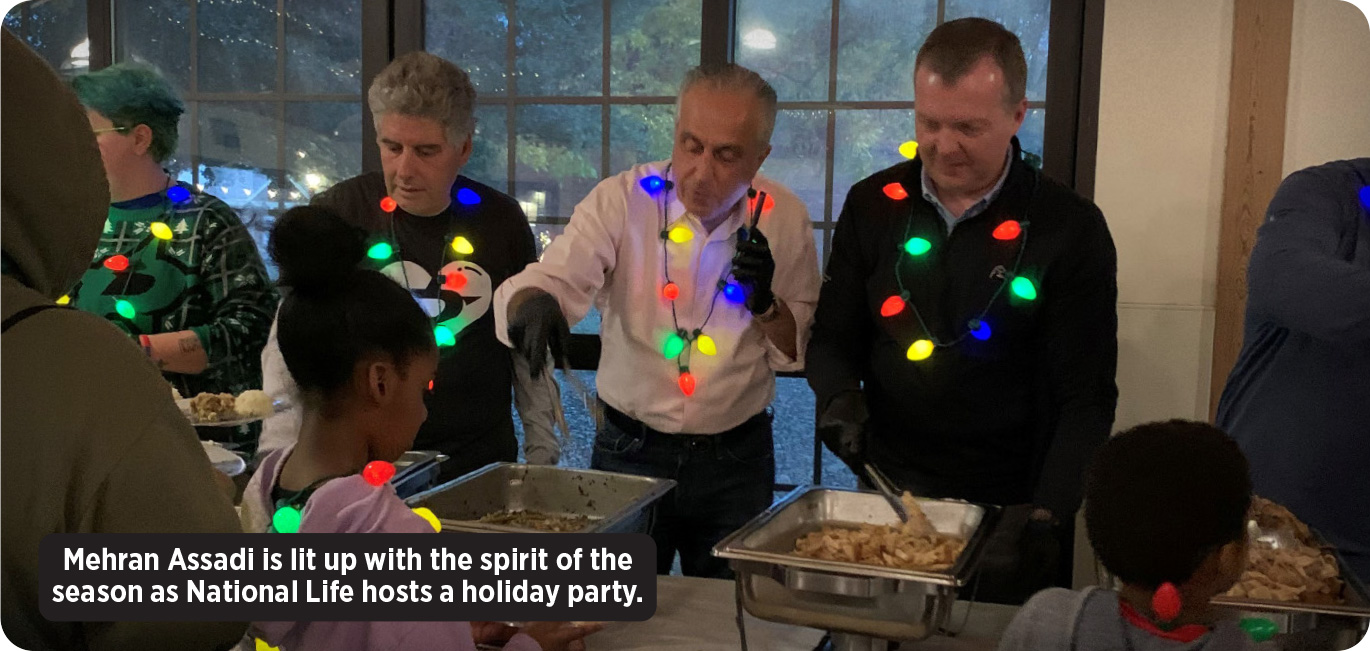
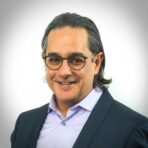
The human side of retirement: Moving beyond the numbers
All in the family — With Stacy Lang Kahan
Advisor News
- Goldman Sachs survey identifies top threats to insurer investments
- Political turmoil outstrips inflation as Americans’ top financial worry
- What is the average 55-year-old prospect worth to an advisor?
- A recession could leave Americans humming 'Oh, Canada'
- Market volatility driven by fear, emotion
More Advisor NewsAnnuity News
Health/Employee Benefits News
- Latest state Dem hospital cost reform skips Econ 101 | HUDSON
- Bill would provide firms refundable tax credit for health-plan premiums
- Most Ugandans Lack Medical Aid Coverage and Worry About Being Unable to Afford Care
- Landry budget grows Medicaid
- GUEST COMMENTARY: We need a better system to pay for health care
More Health/Employee Benefits NewsLife Insurance News